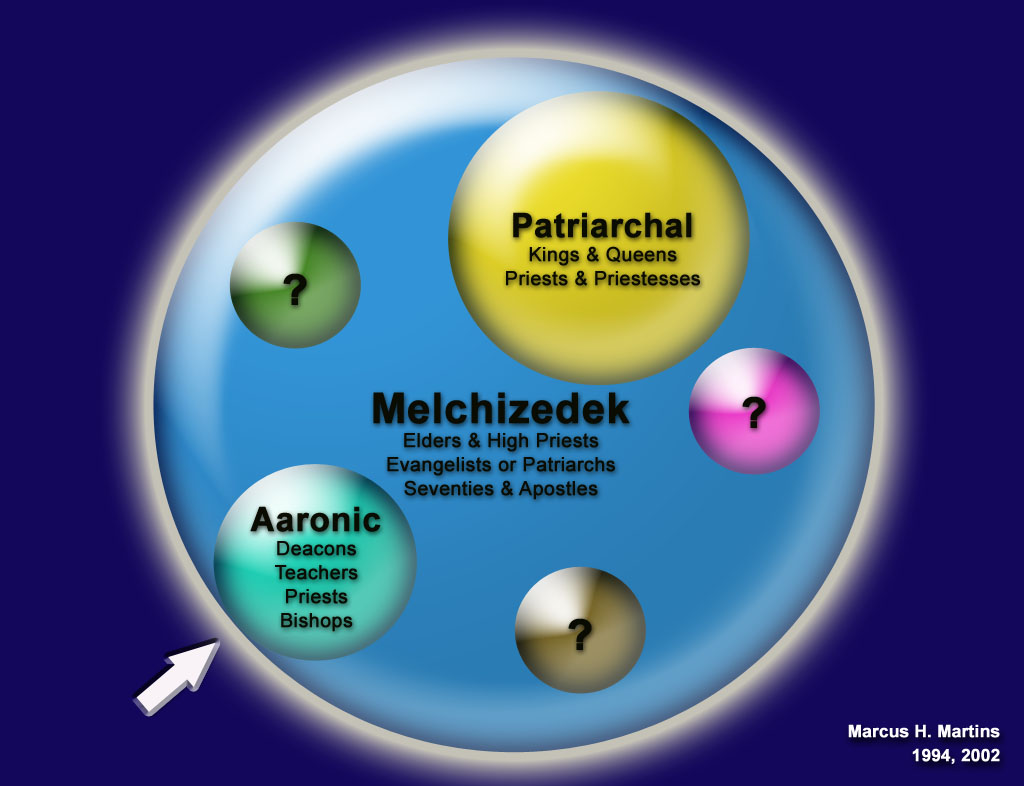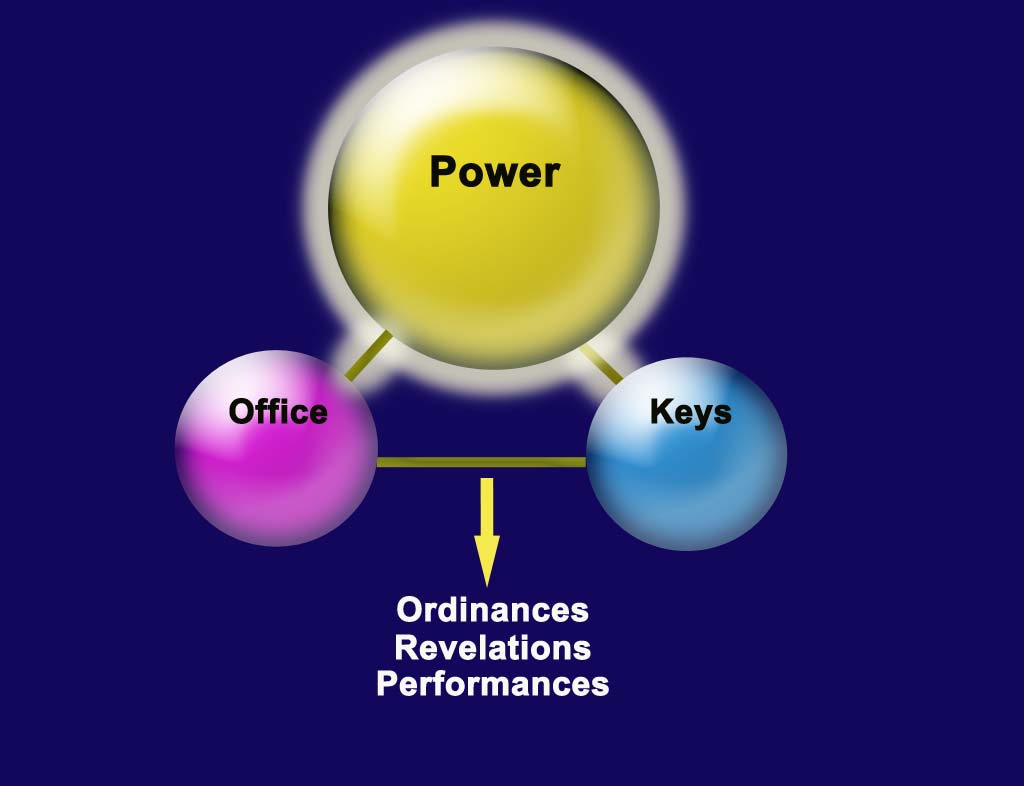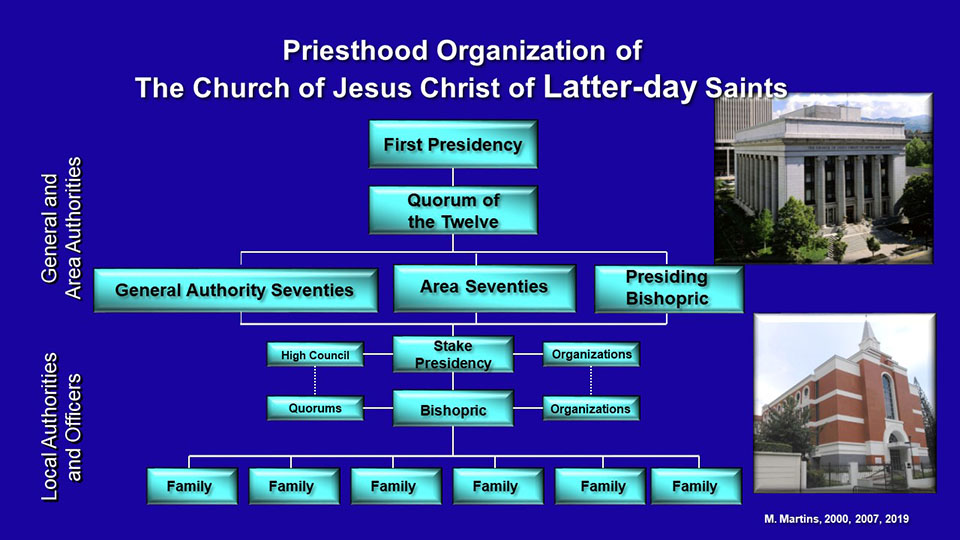 |
Priesthood
Organization and Government
in the Church of Jesus
Christ of Latter-day Saints
Reading
Assignments for the course
REL
480 - Church Organization and Leadership
Prof.
Marcus H. Martins, Ph.D.
Readings:
Readings in this page:
| The Prophet Joseph Smith | Defining the Melchizedek Priesthood |
| President Brigham Young | The Eternal Blessings and Privileges of the Melchizedek Priesthood |
| (Diagrams) | The Orders of the Priesthood |
| Relationship Between Power, Keys, and Office | |
| Priesthood Organization in the Church | |
| Questions for Review |
The Prophet
Joseph Smith
Defining the Melchizedek Priesthood
Teachings, p. 166
[the Melchizedek Priesthood] is the channel through which all knowledge, doctrine, the plan of salvation and every important matter is revealed from heaven. Its institution was prior to the "foundation of this earth...", and [it] is the highest and holiest Priesthood, and is after the order of the Son of God, and all other Priesthoods are only parts, ramifications, powers and blessings belonging to the same, and are held, controlled, and directed by it. ...
[the Melchizedek Priesthood] is the channel through which the Almighty commenced revealing His glory at the beginning of the creation of the earth, and through which He has continued to reveal Himself to the children of men to the present time, and through which He will make known his purposes to the end of time. ...
[The] Melchizedek Priesthood ... holds the highest authority which pertains to the priesthood, and the keys of the Kingdom of God in all ages of the world to the latest posterity on the earth; ...
President
Brigham Young
The Eternal Blessings and Privileges of the Melchizedek
Priesthood
Discourses of Brigham
Young, p. 49
The Priesthood of God, that was given to the ancients and is given to men in the latter days, is co-equal in duration with eternity—is without beginning of days or end of life. It is unchangeable in its system of government and its Gospel of salvation. It gives to Gods and angels their supremacy and power, and offers wealth, influence, posterity, exaltations, power, glory, kingdoms and thrones, ceaseless in their duration, to all who will accept them on the terms upon which they are offered.
[...]
Stake conferences are under the direction of the President of the Quorum of the Twelve Apostles, who calls for the conference and assigns the dates and the presiding leader, as well as an accompanying authority for the pair of leaders needed when stake presidencies are reorganized.
During the pandemic period, when area leaders had questions or concerns regarding the hows, whens and whys to conduct certain stake conferences, they worked closely with the Office of the President of the Quorum of the Twelve Apostles, who in turn is in consultation with the First Presidency and the Twelve.
Area leaders also work closely with the Apostles and members of the Presidency of the Seventy who oversee their respective areas. [...]
But distances did create a problem, when the assigned authorities were not in attendance in person to set apart the new presidency. In those extreme cases and with appropriate approval, a designated local priesthood holder was authorized to set apart the new stake president, Elder [Jorge F.] Zeballos [of the Seventy] explained.
"Each time we could not get to the stake conference location, we proposed to President M. Russell Ballard [President of the Quorum of the Twelve Apostles] a worthy high priest of that stake to be delegated authorization to set apart the new stake president. This has been a great blessing to patriarchs, former stake presidents and other brothers who have been delegated this unusual privilege." [...]
More recently in Portugal, a stake reorganization was a full-on virtual conference -- from the interviews to the callings and from the conference meetings to the new presidency training. Neither Elder [Gary B.] Sabin [of the Seventy] nor the assigned Area Seventy were able to travel because of restrictions, so the outgoing stake president was authorized by President Ballard to set apart the newly called president.
[...]
The Orders of the Priesthood
Doctrine and Covenants 107:1,
5-8, 18-20
 |
 |
In the Church of
Jesus Christ of Latter-day Saints the authority of
priesthood is exercised under the direction of those who hold the keys of priesthood and through a formal office.
The "keys" of the priesthood are specific permissions,
jurisdictions, or limitations. |
Priesthood Organization in
the Church
Doctrine and Covenants
107:21-27, 30
 |
1. Define the keys of the
priesthood: (Pres. Packer, "What Every Elder Should Know--and Every
Sister As Well ...")
2.What keys of the priesthood do the Twelve Apostles receive? (Pres.
Packer, "What Every Elder Should Know--and Every Sister As Well ...")
3. How does the President of the Church receive his priesthood keys?
(Pres. Packer, "What Every Elder Should Know--and Every Sister As Well
...")
4. What kinds of local (i.e. stake and ward level) Church callings
receive keys? (Pres. Packer, "What Every Elder Should Know--and Every
Sister As Well ...")
5. True or False An Elder
holds as much priesthood as an Apostle. (Pres. Packer, "What Every
Elder Should Know ...")
6. What part(s) of the priesthood does a man receive when he is
ordained an Elder? (Pres. Packer, "What Every Elder Should Know ...")
7. How much of the priesthood can a man exercise? (Pres. Packer, "What
Every Elder Should Know ...")
8. When a sister is set apart to an office in the Church, what key(s)
does she receive? (Pres. Packer, "What Every Elder Should Know ...")
9. What is a quorum? (Pres. Packer, "What Every Elder Should Know ...")
10. What is referred to as "Common Consent" or "the Voice of the
People" in the Church of Jesus Christ of Latter-day Saints? (Pres.
Packer, "What Every Elder Should Know ...")
11. How can the system of Church government be considered a
"theocracy"? (Pres. Tanner, "Administration of the Restored Church")
12. What is the responsibility of the Quorum of the Twelve? (Pres.
Tanner, "Administration of the Restored Church")